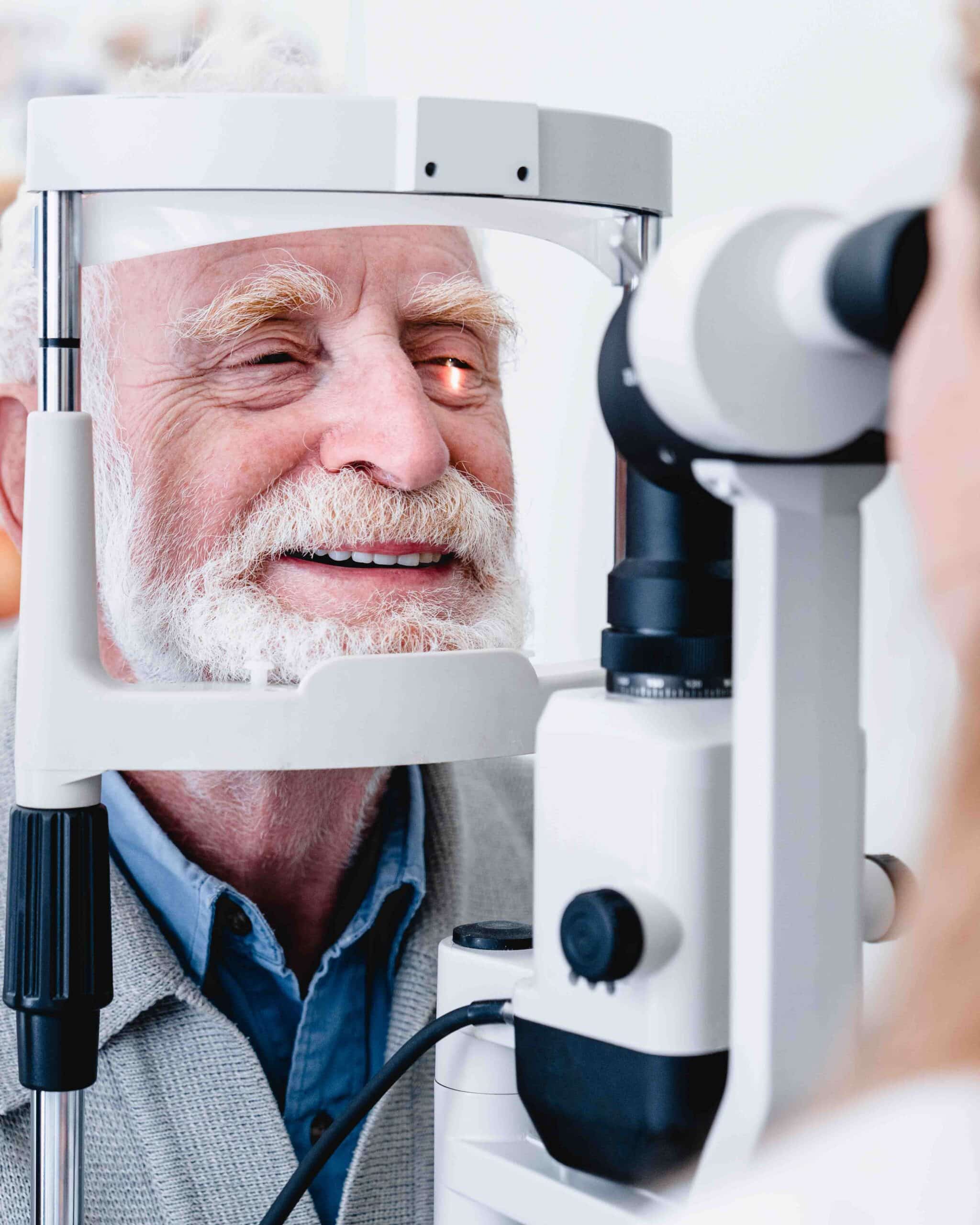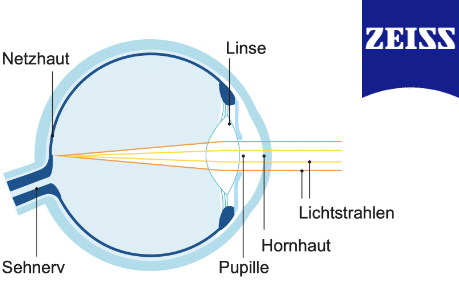Eye surgery from 2,000€/eye
Finally free of glasses! Specialists for eye surgery
Clear vision without glasses or contact lenses through tailor-made lens surgery, exclusively in our private clinic in Wiesbaden. Individually adapted premium lenses for all vision corrections.

Free initial consultation
Fast appointment scheduling
Mass processing? Not here
Your advantages of our private clinic - our 5-star quality for cataracts
Security ★★★★★
Our exemplary, certified hygiene measures and state-of-the-art technologies offer you a safe environment especially for your cataract treatment. With an impressive track record in cataract surgery We guarantee the highest safety standards and put your well-being first.
Individual advice ★★★★★
We offer comprehensive, tailored to you and your specific needs in the treatment of cataracts tailored advice from our chief physician. Our warm and knowledgeable team creates a fear-free atmosphere and guides the cataract surgery carefully with a local anesthetic.
Quality ★★★★★
Our certifications and advanced technology guarantee outstanding quality and customer satisfaction in all aspects of cataract treatment – we focus on quality rather than quantity in every cataract operation.
competence ★★★★★
As experts for cataracts Our entire team, from the dedicated specialist staff to the renowned chief physician, attaches great importance to the highest level of specialist expertise and offers you a first-class all-round service from diagnosis to detailed aftercare.
The most modern lens processes in the LZW
Linsenverfahren sind eine ausgezeichnete Alternative zur Laserbehandlung. Wir bieten eine Vielfalt maßgeschneiderter Methoden für optimale Sehqualität.
Unser Ziel: Ein Leben ohne Brille oder Kontaktlinsen, durch maßgeschneiderte, hochmoderne Behandlungen zu ermöglichen.
Refractive Lens Exchange (CLE)
Refractive lens exchange is a procedure in which the eye's natural lens is replaced to correct diopters.
This procedure is often recommended for people over 45 whose natural lens is losing flexibility and who therefore have problems with near vision. It is also an option for younger people who are not suitable for laser procedures or implantable contact lenses (ICLs).
Different types of IOLs can be used, the most common being multifocal lenses, which allow objects to be seen clearly at all distances – similar to progressive lenses.
cataract surgery
Cataracts, a sign of aging, cause the natural lens of the eye to become cloudy over the course of life, thus reducing visual acuity. This change usually occurs between the ages of 60 and 80, but in some cases it can occur earlier or as a result of eye trauma.
During cataract surgery, the clouded natural lens is removed and replaced with a clear artificial lens. This operation improves vision by restoring the clarity and quality of vision. By choosing multifocal/trifocal IOLs, it is possible to clearly see objects at different distances again even after cataract surgery.
add-on lenses
Add-on lenses are IOLs that are placed in the eye in addition to the artificial lens that has already been implanted. They are used to further improve the quality of vision or to meet specific visual requirements (e.g. near vision).
These lenses can be inserted, replaced or removed later to optimally adjust vision. They are particularly suitable for patients who need fine-tuning of their vision after cataract surgery or other eye surgery.
Implantable contact lenses (ICL)
ICLs are temporary solutions for patients under 40 years of age with high levels of refractive error or thin corneas.
Eye surgeries:
Which procedure is right for you?
Are you ready to free yourself from the limitations of glasses or contact lenses? Discover the variety of lens procedures and options that fit your lifestyle with our test. Learn more about customized solutions for your eyes.
Glasses-free in old age through the use of premium lenses for cataracts
At LZW we offer effective, outpatient and painless treatment for cataracts, an age-related clouding of the lens of the eye. Our diverse lens models enable you to see clearly in all areas of vision - from near to far.
Dr. Steinhorst, our experienced chief physician, personally replaces the clouded lens with a high-quality premium lens implant. This operation not only enables complete healing of the cataract, but also excellent visual acuity without additional glasses.
Mit ihrer hohen Erfolgsbilanz stellt diese Methode eine der beliebtesten Augenoperationen weltweit dar.
Haben Sie eine spezielle Frage, die Sie lieber schriftlich klären? Hier erreichen Sie unser Patienten-Team direkt.


quality standards with premium lenses from ZEISS
Get detailed advice from our chief physician and find the right premium lenses for your eyes.
ZEISS information brochures – patient information
Discover advanced cataract treatment options through our detailed ZEISS information brochures. Each brochure provides specific insights into different intraocular lenses tailored to different vision needs and lifestyles:
Advanced lens surgery at the LaserZentrum Wiesbaden
Preparation on the day of surgery
Preparation for lens surgery plays a crucial role in its success and patient safety. Here are some key points to consider:
- No cosmetics: Avoid creams, makeup, aftershave and perfume to reduce the risk of infection.
- Comfortable clothing: Choose clothing for maximum comfort before and after the procedure.
- Light meal: Eat a light meal a few hours before the procedure and drink enough clear liquids to ensure a stable circulation. If you are using a short-term anesthetic, please remain fasting.
- Planned return journey: Organize a safe ride home, as you will not be able to drive yourself after the procedure.
Following these guidelines will go a long way in ensuring patient safety and comfort before, during and after lens surgery.
Procedure of lens operations
The surgeon makes a minimal incision (approx. 2 mm) and a paracentesis to gain access to the eye and thus operate "in a closed system". A viscoelastic substance is injected to protect the internal structures of the eye and create space for the surgical instruments. The cloudy lens is then removed using phacoemulsification, a technique that uses ultrasound waves. The final placement of the intraocular lens is carried out precisely in the capsular bag of the eye. The small incision closes itself thanks to the special tunnel technique, so that no stitches need to be removed later. A transparent eye patch is placed for postoperative protection.
Behavior after surgery
Typically, patients recover quickly after surgery, although recovery time may vary from individual to individual. Immediately after the procedure, slight blurriness caused by eye ointment and initial corneal swelling is normal; however, this improves quickly. It is important to remain calm, avoid rubbing the eye, and use pain medication if needed. To ensure a successful recovery, it is essential to follow the doctor's instructions carefully.
During the first few days after surgery, it is advisable to avoid physical exertion and protect the eye from unnecessary pressure. Regular follow-up examinations are necessary to monitor the healing process.
effectiveness of the operation
Most patients experience a significant improvement in vision, which means a significant increase in quality of life.
The intraocular lenses used are long-lasting and usually do not need to be replaced. However, it is important to discuss possible risks and side effects with your ophthalmologist in order to make an informed decision about the procedure.
During the first few days after the procedure, patients should avoid physical exertion and be careful not to subject the eye to unnecessary pressure. Regular follow-up examinations are necessary to monitor the healing process.
Endlich brillenfrei – das sagen unsere glücklichen Patienten
Based on authentic experiences and outstanding results, we are proud to be the best-rated laser eye clinic in Wiesbaden. Our 4,8 Sterne bei Google Reviews speak for themselves. Together we will accompany you, step by step, on the way to a life without glasses.





